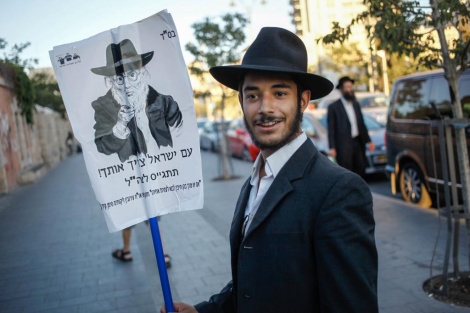Ultra-Orthodox Integration: It Takes Two to Tango
In the op-ed below, IDI researcher Dr. Haim Zicherman discusses the steps that Israeli society must take in order to enable ultra-Orthodox men to integrate into the Israeli army and workforce.

Published in: Ynet News
The "society of learners," a model in which ultra-Orthodox men devote their lives to Torah study, was established by the Chazon Ish, the leader of the ultra-Orthodox community in the early years of the State of Israel, and was later strengthened by Rabbi Elazar Shach, leader of the second generation of Haredi Jews in Israel. The emphasis on this way of life has led to a situation in which most Haredi men engage in Torah study exclusively, and do not share in shouldering the two most prominent material burdens of Israeli life: the security burden and the economic burden.
In recent years, the Israeli government has been trying to bring about change in the lifestyle that has characterized ultra-Orthodox men in Israel for the last three generations. The proposed changes would be in three areas: first, efforts would be made to expand the horizons and increase the general knowledge of Haredi men, which would be followed by professional training at a later stage. Second, ultra-Orthodox men would be expected to participate in the burden of Israel's defense through either military or civil service. Third, Haredi men would be integrated into the Israeli labor force and would pay taxes to the public purse.
These demands, which may seem simple and trivial to people with Western values, are a real threat to the central enterprise that characterizes the Israeli ultra-Orthodox community: the society of learners. Moreover, these changes threaten the lifestyle of the individual Haredi, who fears, probably rightfully so, a decline in spirituality.
Leaving the cloistered and protected environment of Torah study to enter the coarse and secular Israeli experience is a difficult and complex decision for the young Haredi man. It requires an existential change of identity and practice, and a dramatic change in lifestyle. Nonetheless, many ultra-Orthodox men are making their way, slowly and tentatively, to the labor market. Thousands are standing behind them, watching the progress of these daring pioneers who, like Nachshon of the Bible, are the first to cross the sea. The success of these trailblazers may cause many others to follow suit.
However, it is unreasonable to think that only ultra-Orthodox society must change. Successful integration of young Haredi men requires significant concessions on the part of general society in Israel as well. As in any relationship, the expectation that the other side is the only one that will change is unrealistic. The situation in our national life parallels the situation in our personal lives. Consider the following:
What is currently being demanded of ultra-Orthodox men? Are they being asked to make an essential change in their identity, which will make them less Haredi, or are they simply being asked to become involved in sharing the security burden and economic burden of Israeli life?
I believe that a country with democratic and liberal values cannot use coercive authority to change the identity of a minority group. If this is true, the Haredi community must be allowed to integrate into a Western lifestyle while still maintaining its ultra-Orthodox ethos and culture, and for that to happen, Israeli society must make certain concessions in the nature of its natural habitat that will enable the Haredim to be absorbed.
Institutions of higher education must accept the cultural and religious need of the ultra-Orthodox community for unique accommodations, both in terms of gender segregation and in terms of admissions requirements, and must make efforts to facilitate the absorption of Haredi students in a variety of academic programs.
The IDF and the National Civil Service must take steps to adjust the conditions of service to accommodate the ultra-Orthodox way of life in a manner that will minimize the points of friction. While this does not mean that every demand or whim of ultra-Orthodox soldiers or participants in national service must be accommodated, these frameworks must avoid changing Haredi culture, as it is understood and lived by ultra-Orthodox Jews, at all costs.
The Israeli media must avoid extremist discourse and incendiary language, which adds to the feeling of estrangement and alienation between different segments of Israeli society, since integration cannot grow on a bed of alienation.
Finally, the Israeli job market must take steps to absorb the ultra-Orthodox, impartially and without discrimination. Tens of thousands of ultra-Orthodox men and women, some who already have undergone professional training, wish to integrate into the Israeli labor market. Opening the door for them is a national mission that will benefit Israeli society, Israeli employers, and, of course, the individuals who are entering the workforce themselves.
Dr. Haim Zicherman is a researcher at the Israel Democracy Insitute, teaches law at Ono Academic College, and is the author of Black, Blue-and-White, a Hebrew book about the ultra-Orthodox community in Israel (Yedioth Books, 2014).
- Tags:
- Education,
- Identity,
- Judaism and Democracy,
- Regulation of the Media,
- Minorities,
- Religion and State,
- Ultra-Orthodox,
- Arab Society,
- Haredi Conscription,
- ultra-Orthodox/Haredi,
- IDF,
- IDF service,
- Jewish identity,
- Jewish thought,
- Judaism and democracy,
- Judaism and/vs. Democracy,
- media,
- media and politics,
- Military and Society,
- religion and state,
- Religious-Secular Relations,
- rights,
- Rule of Law,
- Unemployment,
- Israeli society,
- Religion and State Program
